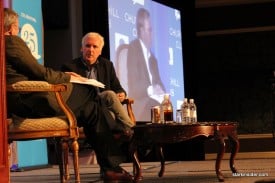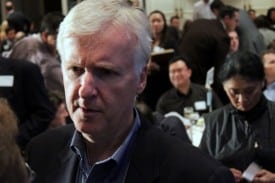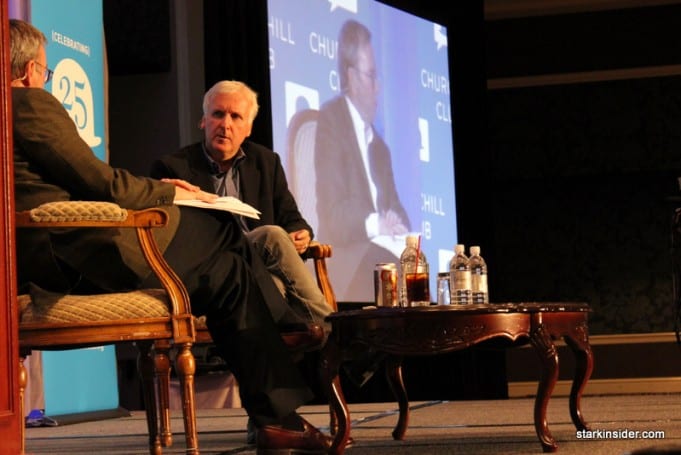“I think it’s a done deal,” said James Cameron referring to 3-D film during his visit to Silicon Valley. “The only thing standing between right now and all movies been made in 3-D is the acceleration of 3-D television.”
It was just one of many interesting points raised during the event hosted by the Churchill Club, now celebrating its 25th year. Google CEO Eric Schmidt moderated a 90-minute on-stage conversation in front of a sold-out room of about 500 members at the Fairmont Hotel downtown San Jose.
 As I mentioned in our photo post, watching a conversation between Cameron & Schmidt is the polar opposite of Hannity & Colmes. Thankfully, facts, information, and science, are all central to their thoughts and ideas.
As I mentioned in our photo post, watching a conversation between Cameron & Schmidt is the polar opposite of Hannity & Colmes. Thankfully, facts, information, and science, are all central to their thoughts and ideas.
The biggest question on most film-goers’ and tech enthusiasts minds will be, of course, related to the Avatar sequels. Cameron mentioned the press announcements that hit the trades this week about Avatar 2 and 3. Aside from that, not a whole lot was revealed, despite Schmidt prodding him to “now tell us the plots.” During Q&A, Cameron did provide a couple of interesting nuggets. One is that he would like to shoot the sequels at a higher frame rate than the current 24 fps limitation of film; perhaps at 48, 60 fps, or even higher. The reason? It helps reduce or eliminate motion artifacts. Another area of focus will be perfecting virtual water effects — light streaming into the depths of the ocean, and the shimmering, wavy surface being just a few examples.
Donny Deutsch would be pleased: this particular conversation was all about the “Big Idea.” And there were many of them. As you can imagine having the top grossing film-maker of all-time on-stage together with the CEO of one of the biggest and most influential tech companies in history can make for a creative spark or two. So here are some of my favorite quotes of the evening.
On what’s next
“I’ve just announced that we’re doing a second and third Avatar film… we’re doing them as a conjoint production… where there will be four years before the first one comes out (part) and then the next will come out a year later…”

On his approach to Avatar
“My first step is to work with the artists… the guys with pencils… and doing their renderings in Photoshop… when the walls are covered with artwork then I feel like I can work on the script… the biggest risk for us is that performance capture was not going to work or capture the emotion…”
“It’s not about capturing a perfect image of the face. It’s actually somewhat sloppy.,. what was important is to train the system to understand the actor, and we would do that by having the actors read the scene in front of a matrix of 12 HD cameras…tt was a 9 month process for each actor.”
“I really wanted these to be the best flying scenes we’ve ever seen. I wanted you to have that sense of vertigo.”
On 3-D
“We see in 3-D. It’s how we see the world.”
“A big breakthrough is when it comes into the home which will most likely be sports and games.”
“We’re about 4 to 5 years away (from stereoscopic)… they need more pixels in the image matrix. The breakthroughs in resolution. In manufacturing. Need to happen before we have large screen 3-D… these are all governed by Moore’s Law.”
“The thing that will hold it back is poor quality 3-D content.”
On messages in film and Avatar
“Any movie can be a teaching moment.”
“There is something right now in the human psyche and the human heart which acknowledges that we are becoming disconnected from nature. and that we have a debt to the natural world… if we don’t take control of our role, of stewardship of the planet then the world that we bequeath to our children and grandchildren is not going to be a livable place.”
On exploration vs. conservation
“I was so involved in exploration … space projects … exploration is not as important as conservation right now. The oceans are dieing… a one or two degree temperature rise will take out most of the corral reefs… they’re the breeding area for over a quarter of the fish.”
“I’ve dialed down my exploration projects… it’s a shift of focus.”
On reaching the bottom of the ocean
“We’re doing that!”
“We’ve already pressure tested our vehicle [4 years in the making]… we plan to make multiple dives and explore these deep trenches.”
Schmidt: “Roughly 97% of the ocean is unmapped.” Cameron: “This must drive you crazy!”
On Arnold
“We’ve been friends for 26 years. He’s just Arnold. It’s hard for me to call him the Governor.”
On coming to Hollywood from the outside
“When you do come to Hollywood from the outside as opposed to coming up on the inside in some nepotistic way you do have an inferior complex. You tend to work harder.”


